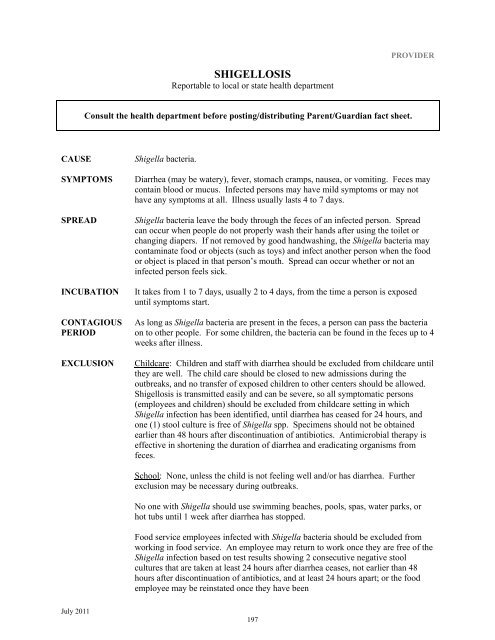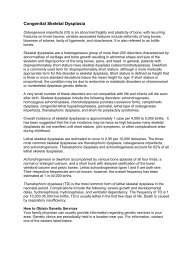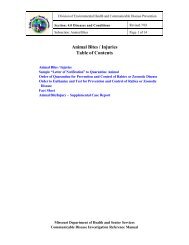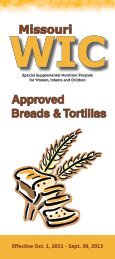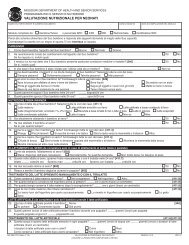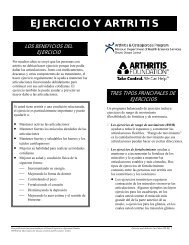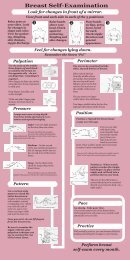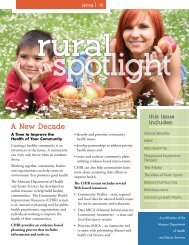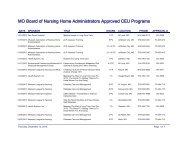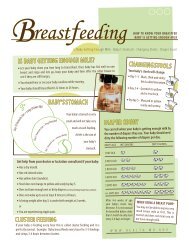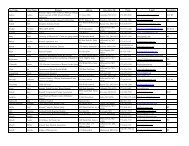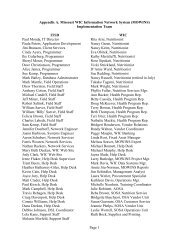Prevention and Control of Communicable Diseases - Missouri ...
Prevention and Control of Communicable Diseases - Missouri ...
Prevention and Control of Communicable Diseases - Missouri ...
You also want an ePaper? Increase the reach of your titles
YUMPU automatically turns print PDFs into web optimized ePapers that Google loves.
July 2011<br />
SHIGELLOSIS<br />
Reportable to local or state health department<br />
Consult the health department before posting/distributing Parent/Guardian fact sheet.<br />
CAUSE Shigella bacteria.<br />
197<br />
PROVIDER<br />
SYMPTOMS Diarrhea (may be watery), fever, stomach cramps, nausea, or vomiting. Feces may<br />
contain blood or mucus. Infected persons may have mild symptoms or may not<br />
have any symptoms at all. Illness usually lasts 4 to 7 days.<br />
SPREAD Shigella bacteria leave the body through the feces <strong>of</strong> an infected person. Spread<br />
can occur when people do not properly wash their h<strong>and</strong>s after using the toilet or<br />
changing diapers. If not removed by good h<strong>and</strong>washing, the Shigella bacteria may<br />
contaminate food or objects (such as toys) <strong>and</strong> infect another person when the food<br />
or object is placed in that person’s mouth. Spread can occur whether or not an<br />
infected person feels sick.<br />
INCUBATION It takes from 1 to 7 days, usually 2 to 4 days, from the time a person is exposed<br />
until symptoms start.<br />
CONTAGIOUS<br />
PERIOD<br />
As long as Shigella bacteria are present in the feces, a person can pass the bacteria<br />
on to other people. For some children, the bacteria can be found in the feces up to 4<br />
weeks after illness.<br />
EXCLUSION Childcare: Children <strong>and</strong> staff with diarrhea should be excluded from childcare until<br />
they are well. The child care should be closed to new admissions during the<br />
outbreaks, <strong>and</strong> no transfer <strong>of</strong> exposed children to other centers should be allowed.<br />
Shigellosis is transmitted easily <strong>and</strong> can be severe, so all symptomatic persons<br />
(employees <strong>and</strong> children) should be excluded from childcare setting in which<br />
Shigella infection has been identified, until diarrhea has ceased for 24 hours, <strong>and</strong><br />
one (1) stool culture is free <strong>of</strong> Shigella spp. Specimens should not be obtained<br />
earlier than 48 hours after discontinuation <strong>of</strong> antibiotics. Antimicrobial therapy is<br />
effective in shortening the duration <strong>of</strong> diarrhea <strong>and</strong> eradicating organisms from<br />
feces.<br />
School: None, unless the child is not feeling well <strong>and</strong>/or has diarrhea. Further<br />
exclusion may be necessary during outbreaks.<br />
No one with Shigella should use swimming beaches, pools, spas, water parks, or<br />
hot tubs until 1 week after diarrhea has stopped.<br />
Food service employees infected with Shigella bacteria should be excluded from<br />
working in food service. An employee may return to work once they are free <strong>of</strong> the<br />
Shigella infection based on test results showing 2 consecutive negative stool<br />
cultures that are taken at least 24 hours after diarrhea ceases, not earlier than 48<br />
hours after discontinuation <strong>of</strong> antibiotics, <strong>and</strong> at least 24 hours apart; or the food<br />
employee may be reinstated once they have been


